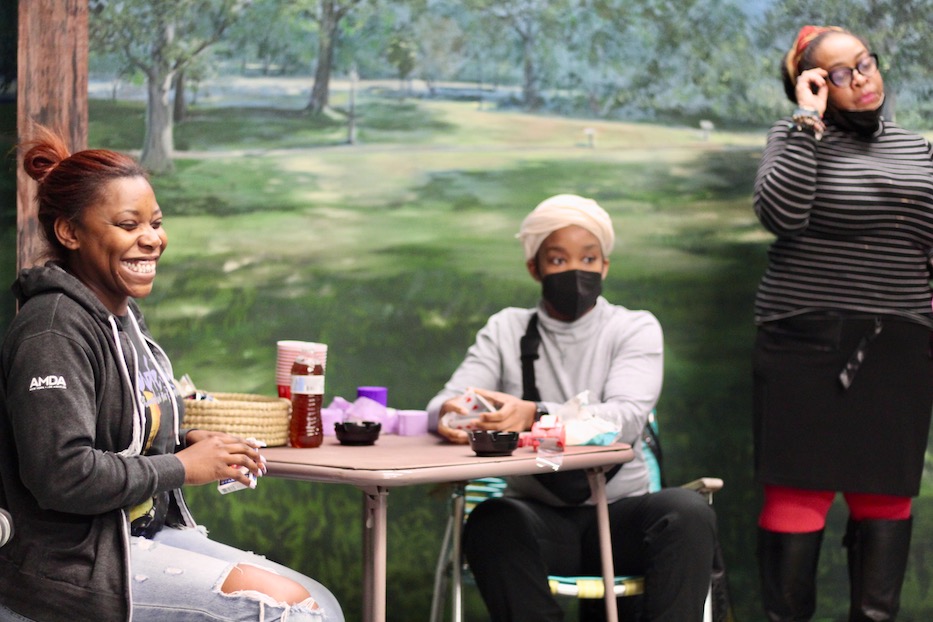
Collective Consciousness Theatre | Culture & Community | Erector Square | Fair Haven | Arts & Culture | Arts & Anti-racism | Neighborhood Cultural Vitality Grant Program
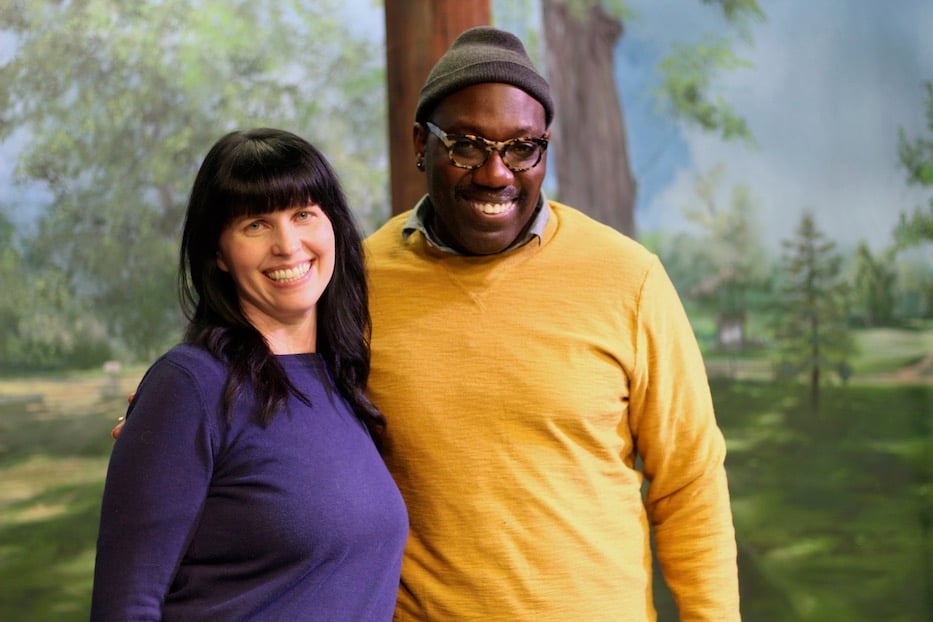
Jenny Nelson and Dexter Singleton. Barbecue runs at Collective Consciousness Theatre, 319 Peck St., from March 23 through April 8. Shows run Thursdays through Saturdays only.
James T is running his mouth again. In his left hand, a flip phone rests between his thick fingers, its plastic body still sleek. “Now y'all wanna sit back today and act like we a normal gatdamn family,” he spits. A can of beer, half full, is gently warming in his right hand. “We ain’t no normal gatdamn family and we ain’t never been no normal gatdamn family—” Green foliage explodes all around him. “But now all of a sudden ya’ll read a book or see a tv show and ya’ll wanna gather up and act like we a normal gatdamn family.”
The trees stand completely still, so close it seems like they’re listening. It’s less than two minutes into the call, and already, the questions abound. Who is he talking to? What’s got him so riled up? Who else is he expecting? And what in this story belongs to him, and to his family, at all?
A sharp, biting and thoughtful humor defines Robert O’Hara’s Barbecue, running at Collective Consciousness Theatre (CCT) Thursdays through Saturdays, March 23 through April 8. Deftly directed by Jenny Nelson and produced by Dexter Singleton, it marks a long-awaited return to the theater, with a cast and crew that comes back swinging. By the end of the show, it has become a blistering and funny interrogation of ownership, appropriation, collective memory, class boundaries, and the precariousness of a dominant narrative.
All shows take place in CCT’s longtime home at 319 Peck St., on the second floor of Erector Square’s building 6S. Tickets and more information here.
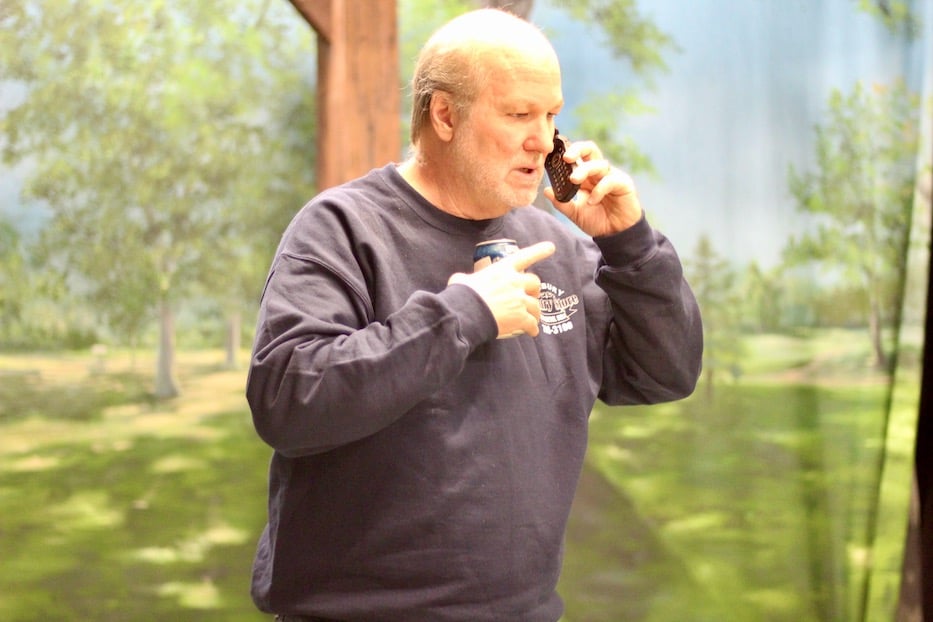
Geoffrey Sheenan in Barbecue.
“We just wanted to come back big for our community,” Nelson said at a rehearsal Tuesday night, as actors ran through warmups beneath a pavilion built into the set. “We wanted to give them something really fun and entertaining but also thought provoking, and asking those questions. It’s still rooted in race, class, and culture, all the things that are important to us, but with this really hilarious script.”
“To come back here, it’s like we’re always coming back home,” Singleton added. “The impact that CCT makes on the community, all the people that missed it and wanted it back, artists that spent so many evenings and weeks at a time here, that’s really what it’s about. Being able to open this place back up again.”
Written by O’Hara in 2014 and first produced at the Public Theater in 2015, Barbecue is a show about many things, including the porousness of language, the construction of race and class, and the public spectacle of other people’s trauma.
Set in a lush public park in the near past, the play opens on the O’Mallery family, four grown siblings who are working to wrangle the fifth, their sister Barbara, into rehab far away. The place seems nice enough—yoga, equine therapy, and a new setting—but there’s more than a sneaking suspicion she won’t want to go.
Her reputation precedes her: she is the relative that most of us have, who can go nuclear with just the right amount of substances in her system. When siblings introduce here as Zippity Boom, it’s a nickname audiences can parse almost immediately.
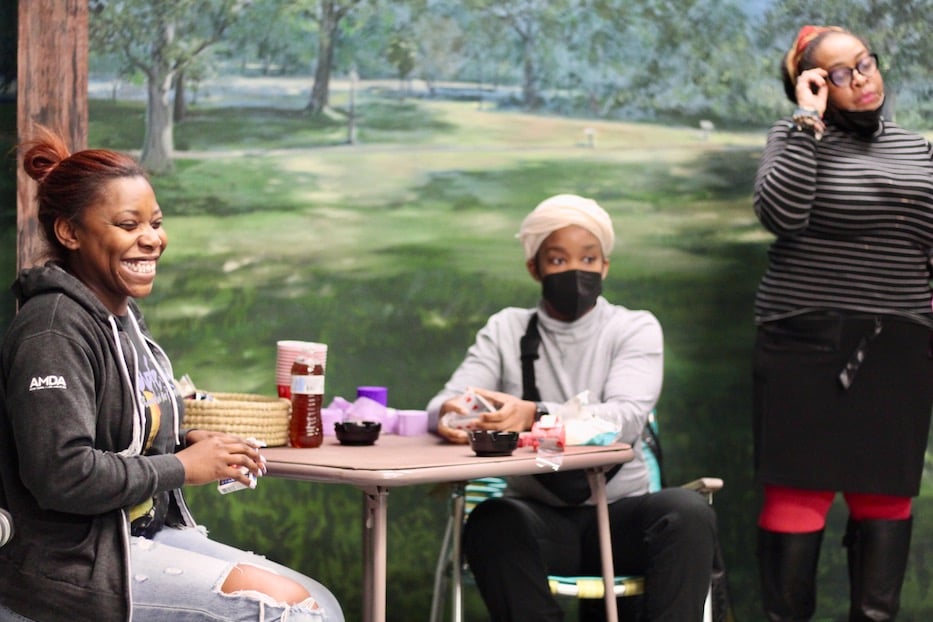
Kendall Driffin, Jacque Brown, and Elizabeth Reynolds in Barbecue.
From the get, O’Hara is playing with the idea of the line—where it is, where it blurs and kinks, and what it takes to cross it. All of siblings have some vice, a reminder of how selective the language of addiction has become. None of them, it seems, made it out of childhood completely unscathed. But it is Barbara whose habit is deemed severe enough for treatment. In this sense, an intervention is the perfect device: it raises its own questions about perception, truth, and consent, and somehow manages to be comical while doing it.
Scene by scene, O’Hara begins to peel back the layers on the intervention—which really is to say, the layers on the O’Mallery family—leaving plenty of gray in a world where substance use disorder is often painted as black and white. In one universe, Barbara’s family is the one that gets a casserole and a Hallmark card when she goes to rehab, because she has a disease. In the other, Barbara’s family is dealing with a system that has criminalized and punished families, because her addiction is a moral failing.
As one O’Mallery family splits into two, O’Hara begins to push on an audience’s understanding of both, asking them to explore how they perceive and stereotype the world around them on a daily basis. It’s a tight and biting device from the playwright, also known for his 2014 “Bootycandy" and direction of Jeremy O. Harris’ Slave Play.
As it hits New Haven, it comes together in the hands of an extremely able cast and crew. From the moment lights come up, actors are mining the potential for laughter, walking that tightrope of what’s appropriate and what’s overkill. Cast members—particularly Debra Walsh, Laura Sheenan, and Kendall Driffin—put their entire bodies into the show, with a knack for physical acting in a way that makes them feel deeply human.
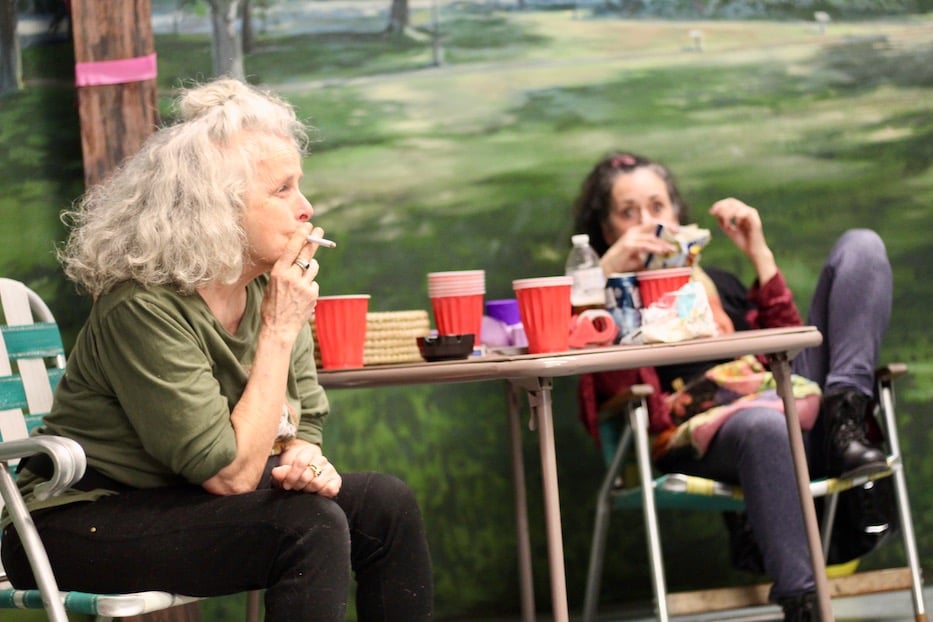
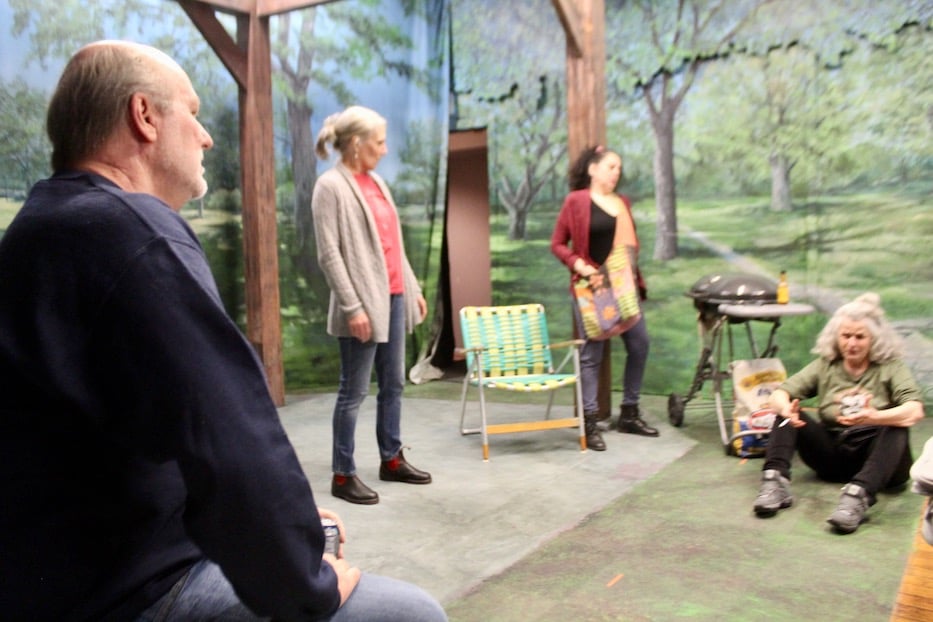
Top: Debra Walsh. Bottom: Cast members in Barbecue.
As two parallel O’Mallery family narratives unfold (per CCT’s request, that’s the only spoiler that will make it into this article), cast members mirror each other, using a shared language and family history that exposes race and class as both socially constructed and historically entrenched. It’s a sharp, rhetorically tight trick built into the script, and one at which cast members shine.
Just as certain actors master physical humor, Susan Kulp and Elizabeth Reynolds, as well as Geoffrey Sheenan and Raphael Massie, are particularly adept here, playing verbal hopscotch as they unfold the story. In so doing, they nimbly reveal how absurd the binaries, the prejudices, and the country’s consistent disdain for poor people is.
The set, a public park designed and painted by artists David Sepulveda and Amie Ziner, is a character itself, as much a part of the action as the bodies that move, laugh, dance, and challenge each other upon it. In the small blackbox theater, it wraps nearly half of the space, in an extension meant to make the audience feel like it is very much part of the show.
On Tuesday, as actors opened cans of seltzer and flipped burgers against it, it could have been an afternoon in West Rock Park or College Woods, where half a dozen birthday parties sprawl out over the space on a given afternoon.
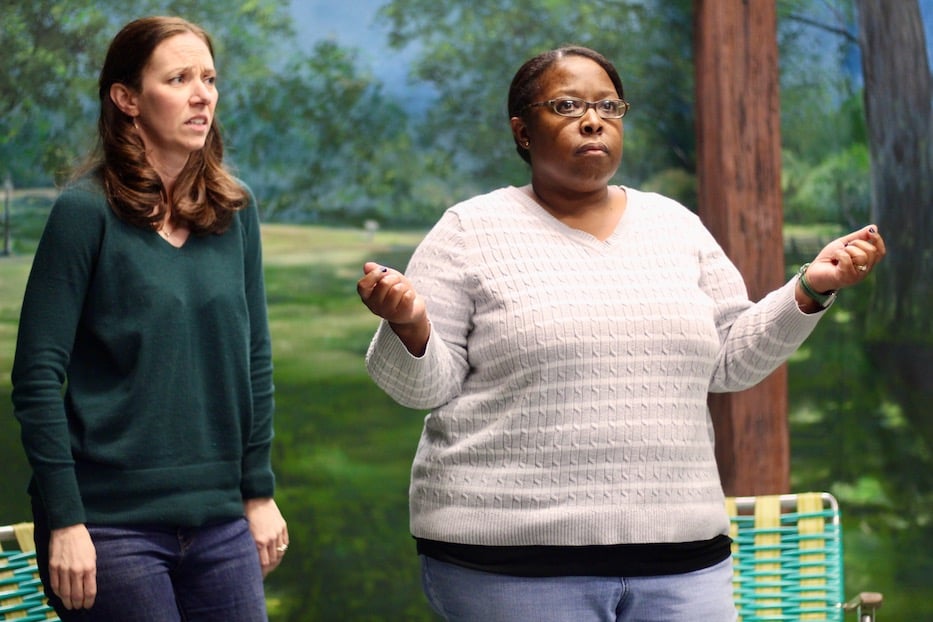
Michelle Burns and Jamie Guite in Barbecue.
For Nelson and Singleton, it is the right show to return to the theater after an unwelcome pandemic intermission. When Covid-19 hit New Haven in March 2020, CCT was midway through its run of Dominique Morisseau’s Skeleton Crew, which follows Michigan auto workers during the 2008 financial collapse. Tuesday, Nelson remembered standing in the parking lot of Long Wharf Theatre, which had just announced its 2020 season, and thinking any shutdown would run just a few weeks.
“I’m kind of glad we thought that, because if we knew what was going to happen, we would have been really panicked,” she said Tuesday.
Weeks became months, and months became years. Nelson and Singleton both started new jobs, at Westport Country Playhouse and Theatre Squared respectively. As gathering became safer in 2021, they tried to bring Skeleton Crew back with the same cast, but “it just never really worked out for us,” Singleton said. It was impossible to get everyone in the same place.
Then the theater rallied, thanks in part to a Neighborhood Cultural Vitality Grant from the city. Only weeks ago, when Ziner and Sepulveda finally started work on the set for Barbecue, did the space start feeling reborn again.
“It was hard to come back into this space and see it frozen in time for so long, and feeling like it really wanted to come back to life,” Nelson said. “We really tried, everybody tried to have Skeleton Crew come back and it just—the world changed. Things changed. It was hard to see it here.”
Weeks later, the set extends into the first few rows of the audience, making attendees feel like they have a stake in the action as it unfolds. And they do: Barbecue leaves an audience with something to chew on, served sizzling hot.
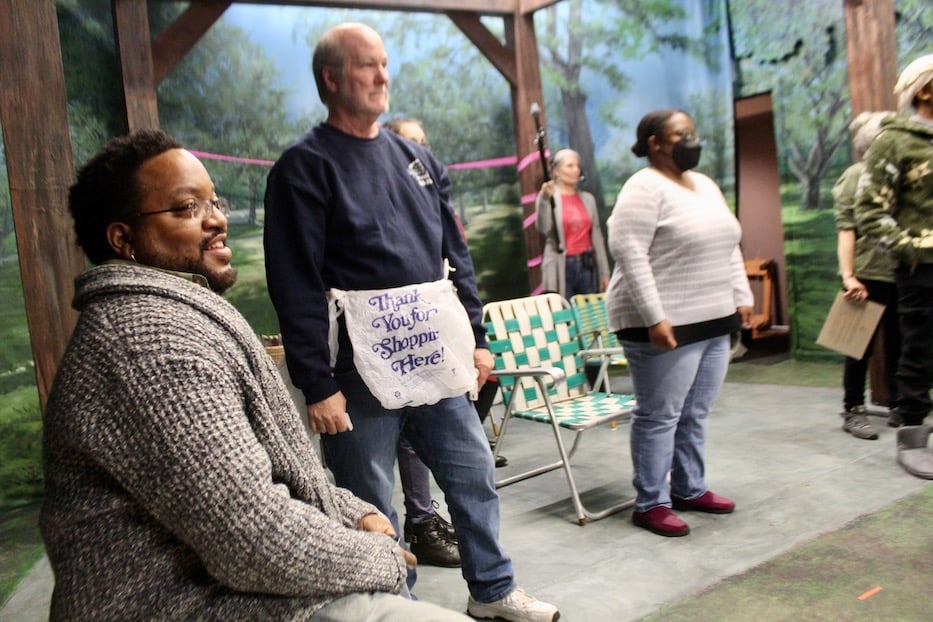
The cast of Barbecue. Raphael Massie is pictured at far left.
It also opens a discussion for the theater, where incisive social commentary has often come only on dramatic form, around who gets to tell specific stories. When Covid-19 hit, Singleton was still relatively new to his job at Theater Squared, a Fayetteville-based stage that now has him commuting to Arkansas from New Haven at least once every three or four weeks. Nelson joined Westport Country Playhouse, where she is now the director of education and community engagement.
When they read the show, Nelson said, they knew it was the one. She can’t remember the last time she laughed out loud at a script, she said. Singleton, who has known about the work for nearly 10 years, said it set the right tone to bring an audience back. That isn’t to say it’s a soft landing: Barbecue gives a viewer plenty to think about, no matter what their lived experience may be.
And if Barbecue is a nesting doll of a play, it also reflects the new normal into which Nelson, Singleton, and the cast are stepping. Beyond masked rehearsals, weekly testing regimens, and temperature checks at the door, there’s been a reckoning with white supremacy and an equally strong backlash that wasn't quite the same in 2020. Nelson said the past three years have pushed her to think more critically about what plays she should be directing as a white woman, and what plays she should step back from to make space for new directors. That’s also her hope for the show.
“You sit in this theater, you have a communal experience with a group of people you’ve never met, that you may never see again, you have an experience together,” she said at a rehearsal Tuesday night, as actors ran through warmups beneath a pavilion built into the set. “Which is what makes theater so special. That thing of sitting in a dark space with a group of people, having the same shared experience together, is really what theater does best.”
Robert O’Hara’s Barbecue runs at Collective Consciousness Theatre, 319 Peck St., from March 23 through April 8. Shows run Thursdays through Saturdays only.

